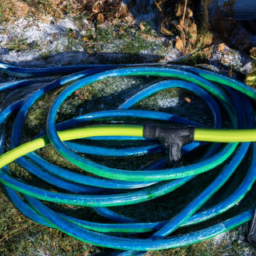How To Keep Garden Hose From Freezing
How To Keep Garden Hose From Freezing
Introduction
Winter will soon be here, and with it the temperatures will drop which can spell disaster for your garden hose. Hoses are not meant to be exposed to freezing temperatures, so keeping your garden hose from freezing is essential for keeping it in working condition. This article will provide practical tips on how to keep your garden hose from freezing.
"?What Causes Garden Hose to Freeze?
When temperatures drop, the water inside the hose absorbs the cold, eventually reaching its freezing point. Once water freezes, it expands which creates pressure inside the hose causing the rubber to crack and weaken. Thus, preventing the hose from freezing is essential to the preservation of the rubber and ultimately, the operation of the hose.
"?How to Protect Garden Hose from Freezing
The best way to protect garden hoses from freezing temperatures is to keep it stored indoors during colder months. If you are unable to keep the hose stored indoors, there are some simple steps you can take to help protect it.
Drain Hose Thoroughly
If you need to leave the hose outside for any reason, it is important to make sure the hose is thoroughly drained of all water to reduce the chances of it freezing. This can be done easily by disconnecting the hose from the water source and opening the nozzle.
Wrap Hose with Insulation
You can also wrap the hose with insulation such as burlap or a foam pipe insulation. This will help to keep the cold out and protect the hose from any icy weather.
Cover the Hose
Covering the hose will also help to protect it from freezing weather. Simple plastic or vinyl covers are available at most hardware stores and Home Depots and are fairly inexpensive.
Empty Hose or Sink Before Winter
You can also empty the hose of all water and store it away before winter arrives. If the hose is connected to a sink, you can also put a winterizing plug in the sink hole to make sure no water can enter the hose.
"?Preventive Maintenance
Some preventive maintenance is also essential for the preservation of your garden hose. The following tips should be followed:
Clean Gutters and Drains
Make sure to clean your gutters and drains regularly to ensure the water can properly flow away from the hose and out of your garden. This will reduce the chances of the hose freezing from standing water.
Store Hose in Shade
It's also a good idea to store your hose in a shaded area. Sunlight can cause the hose to become brittle and crack over time, so shaded areas are best for helping the hose last longer.
Take Care of Hose Connections
Taking care of your hose connections is also essential to its longevity. Consider replacing old, worn out connection parts to make sure the hose can handle pressure and doesn't leak.
In Summary
Keeping your garden hose from freezing this winter doesn't have to be a daunting task. By following these practical tips, you can ensure your hose remains operational throughout the winter months and well into the spring. Store the hose indoors whenever possible, cover it if it must be left outside, thoroughly drain it, and ensure proper connections and maintenance. With a little bit of effort, you can keep your garden hose from freezing and save yourself the headache of replacing a damaged hose.

Previous Page
